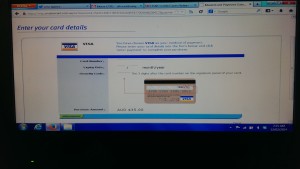June 23rd, 2014 by Elma Jane
How online payments can help improve health care efficacy? 76 percent of providers said that it took more than one month to collect from a patient. However, patients have made it clear that they prefer to have the option of making payments online. Consumer responsibility is also increasing, but many providers still rely on paper-based, manual payment collection and posting processes. As a result of waiting for those payments, providers are spending more money and more time to collect, yet still accumulating a large amount of bad debt.
The majority of providers 76 percent did say that they offered the option of online payments to their patients. As providers and their clients increasingly rely on consumer payments for revenue, many have started to use more consumer-centered strategies, like payment plans, to collect payments. However, they will have to implement best practices and policies, including automating payments and communications and ensuring payment data is secure, to improve collection processes.
Posted in Uncategorized Tagged with: consumer, health care, online payments, payment data, payments, provider's
May 27th, 2014 by Elma Jane
The BACPAC Act, which establishes a site-neutral bundled payment model for Medicare post-acute care (PAC) introduced earlier this week. According to a press release from the Partnership for Quality Home Healthcare, the proposed payment structure would have PAC coordinators and their networks of post-acute care providers manage patient care through a 90-day, site-neutral bundled payment that would be initiated upon a patient’s discharge from the hospital.
CEO for The Partnership for Quality Home Healthcare, said in the company statement that the proposed legislation offers pro-patient solutions that are founded on years of research and analyses. Additionally, those solutions support a more effective and efficient delivery of quality post-acute care services.
As population ages, the need for well managed post-acute care will become a pressing necessity for the sustainability of our healthcare system. The BACPAC Act of 2014 represents positive Medicare reform that benefits patients, providers and taxpayer alike.
One of the major changes that the bill hopes to make is to reduce hospital readmissions. As the Partnership for Quality Home Healthcare explained, readmissions are a common cost-driver in PAC. However, the proposed legislation creates strong incentive for patients to be placed in the most clinically-appropriate, cost-effective setting. From there, it is more likely that patients would receive more efficient care through their treatment plan.
The bill stemmed from the BACPAC analysis that was proposed by the Alliance for Home Health Quality and Innovation in January. The analysis, compiled and explained the benefits of bundled payment options for post-acute care, as well as how providers can control costs. If implemented correctly, bundling payments for chronic care management, rehabilitative and other forms of post-acute care could lead to more efficiency across care settings and encourage care coordination among providers. In the current fee-for-service system, care coordination is often overlooked, resulting in unnecessary tests, procedures and costs to the Medicare program that often do not improve patient care or outcomes. Medicare could see up to $100 billion in savings over 10 years by moving patients into different settings and reducing spending by certain degrees.
Posted in Medical Healthcare Tagged with: Alliance for Home Health Quality and Innovation, bundled payment, bundled payment options, care providers, chronic care management, costs, healthcare, Home Healthcare, Medicare, Medicare program, Medicare reform, networks, patient care, patient’s discharge, patients, payment, post-acute care, post-acute care services, procedures, provider's, Quality Home Healthcare, taxpayer, tests, treatment plan
May 21st, 2014 by Elma Jane
There are no enforced standards in the card processing industry regarding rates, fees, and contractual terms. It is possible for two providers to offer seemingly the same rates and fees that result in different processing costs.
Excessive Monthly, Annual, or Quarterly Fees
There are numerous monthly, annual, or quarterly fees merchants may see on their statements each month. Many merchants pay far more than they should for these fees. The fees may have names like statement fee, service fee, membership fee, regulatory fee, PCI fee, and host of other names. The fair amount each merchant should pay for these fees varies by sales volume and merchant type. Also, the amount a merchant pays for any given fee isn’t as important as the overall processing cost. These are general guidelines; some merchants should pay far less. If you are currently paying more, it may be a good time to review your overall processing cost including your pricing plan, rates, and fees.
Excessive Payment Gateway Fees
A payment gateway route transactions from the merchant’s website to the provider. Some retail point-of-sales devices require a gateway to route the transactions. Merchants generally pay a per-month and a per-transaction fee for use of the gateway. As a rule, the direct cost to process through the gateway is a few cents per transaction.
PCI Non-compliance or Non-validation Fee
Many providers now charge a monthly non-compliance or non-validation fee if the merchant is not PCI compliant. This fee may be in addition to a monthly, quarterly, or annual PCI fee. Supposedly, providers charge the non-compliant or non-validation fee as an incentive for merchants to become compliant. Nonetheless, some providers use this fee more for revenue generation, than as an incentive. Some providers do not charge this fee at all.
Merchants should not change providers because of this fee. Instead, the merchants should become PCI compliant to eliminate the fee and reduce the probability of being breached, which could easily result in huge monetary penalties – tens of thousands of dollars. To become compliant, merchants should complete the PCI Self-Assessment Questionnaire and adhere to the PCI requirements, which may require quarterly scans. In short, if a merchant is being charged a non-compliance or non-validation fee, it is as much the merchant’s fault as anyone else.
Visa FANF Fee
In 2012, Visa started charging providers a Fixed Acquirer Network Fee (FANF). The actual fee charged by Visa is dependent on the merchant type. The fee for customer-present retail merchants is based on the number of locations. The cost for ecommerce and fast food merchants is based on the volume of business. Customer-present retail merchants that have non-swiped transactions can also pay an additional customer-not-present FANF fee.
Most aggregators – i.e., merchant account providers that group multiple merchants into a single merchant account, such as Square, PayPal – integrate the FANF cost into their rates and fees versus itemizing them out separately. Most traditional providers properly pass through the actual Visa FANF fee to their merchants. However, there are a few that treat this fee as another hidden revenue stream. I’ve seen providers charge a flat monthly fee for customer-present merchants and I’ve seen the FANF fee inflated by as much as 50 percent for ecommerce merchants. Keep in mind when reviewing that the fee is generally based on the volume of the prior month. In order words, the fee you see on your statement for April activity is likely based on the March volume, as providers need to know the monthly Visa volume before they can assess the fee.
Unusual Discover Card Fees
For Discover transactions, some providers charge a higher percentage, or higher per-item fee, or monthly access fee.
Posted in Best Practices for Merchants, Credit card Processing Tagged with: (FANF), access fee, aggregators, breached, card processing industry, compliant, contractual terms, customer-not-present, customer-present retail merchants, devices, Discover transactions, ecommerce, ecommerce merchants, fast food merchants, fees, Fixed Acquirer Network Fee, flat monthly fee, gateway, integrate, membership fee, merchant account, merchant account providers, merchant type, Merchant's, merchant’s website, monetary penalties, non-compliance, non-swiped transactions, non-validation fee, payment gateway, PayPal, PCI fee, PCI non-compliance, PCI requirements, PCI Self-Assessment Questionnaire, pci-compliant, point-of-sales, pricing plan, processing cost, processing costs, provider, provider's, quarterly fees, Rates, regulatory fee, retail, retail point-of-sales devices, revenue, route transactions, sales volume, service fee, Square, statement, statement fee, statements, transactions, visa, Visa volume, website
May 7th, 2014 by Elma Jane

NTC’s New Approach On Payment Processing brings Client Satisfaction
About NTC (National Transaction Corporation)
NTC is a credit card processing company that was built uniquely. Combining leading edge technology with passion for customer service, as well as service to help customers maximize the value of their merchant service program. NTC provides sales agents, financial institutions and merchants with benefits not available from other providers, such as next day funding with a late cut-off time and unparallel graphical and web-based reporting.
To learn more visit http://www.nationaltransaction.com or call 888-996-2273.
Marking a 65% increase over 2012 NTC now serves approximately 15,000 businesses.
This rapid growth was driven by the many unique benefits that NTC offers its merchants and sales partners, ranging from best technology to superior customer service.
The major differentiators made possible by NTC’s proprietary back-end processing system is the Next Day Funding Service. Because NTC connects directly to the following: Amex, Discover, MasterCard and VISA. This way sales partners and merchants are able to avoid the middleman and go straight to the source of all their processing needs. This also means that the merchants can batch out their terminal POS with one of the latest cut-off times in the industry by as late as 11:00 pm Eastern.
NTC’s another appealing factor to new sales partners and merchants is its merchant connect online reporting system. It provides 24/7 access to graphical account information through a system that is fast easy and secure. Merchants are now able to clearly see and understand their payment processing costs. ISO’s have access to sugar CRM to make notes and see Merchant Marketing Data. Card Numbers are secure on the banks server so our faculty has credentials to access the bank servers.
Independent sales organizations (ISOs) and Merchant sales professionals continue to choose NTC as their payment processing partner to obtain these unique benefits. In addition to industry-leading technology, NTC offers its merchants and sales partners a level of personalized support that is not easily found among other credit card processing companies. They get round the clock account and terminal support. Collective hard work and determination helped NTC grow faster in the industry, resulted in more loyal ISO sales partners who are submitting more applications. Looking forward for continued success for NTC, its sales partners and merchants.
Posted in Credit card Processing, EMV EuroPay MasterCard Visa, Financial Services, Merchant Account Services News Articles, nationaltransaction.com, Point of Sale, Visa MasterCard American Express Tagged with: amex, back-end processing, bank, bank servers, card, card numbers, credit card processing, credit-card, customer service, Discover, financial institutions, marketing data, MasterCard, merchant, merchant connect, merchant service, next day funding, payment processing, POS, provider's, sales agents, sales partners, sugar CRM, terminal, visa, web-based
January 6th, 2014 by Elma Jane
It can be difficult for travel agencies to choose a merchant services provider. The credit card processing industry generally categorizes travel agents as a high risk business type due to the fact that most travel agency transactions take place long before the actual product or service is delivered to the customer. This leaves travel merchants open to chargebacks and other payment disputes, which are costly procedures that deter many merchant services providers from offering travel merchant accounts.
National Transaction Corporation is one of the travel merchant account providers and credit card processors to provide high risk merchant services for travel agents. Most providers are geared toward e-commerce business types, although some offer options for traditional travel credit card processing. National Transaction Corporation (nationaltransaction.com) is a Coral Springs, FL-based, NTC’s member bank is US Bank Minneapolis, MN; that offers high risk travel agent merchant accounts. NTC’s credit card processing, no holds on funding, integration with Trams, Sabre, and ARC business solutions, and payment gateways for e-commerce travel merchants. National Transaction Corporation’s parent company Elavon, has a grade of “C” award. The Better Business Bureau (BBB) currently grants National Transaction Corporation an “A+” grade, citing only one complaint in the last three years.
Posted in Credit card Processing, e-commerce & m-commerce, Electronic Payments, Internet Payment Gateway, Merchant Services Account, Travel Agency Agents Tagged with: chargebacks, credit card processing, e-commerce, high risk, merchant services provider, no holds funding, payment disputes, payment gateways, provider's, transactions, travel agencies, travel agency, travel agents, travel merchant account, travel merchants
November 15th, 2013 by Elma Jane
November 7, 2013 – Payment Card Industry (PCI) Council’s recent acceptance of the world’s first Point-To-Point Encryption-validated solution is great news for both acquirers and merchants, and will aid in reducing merchant scope and increasing business security worldwide. If your P2PE know-how is a little spotty, here are the basics.
What is P2PE?
Point-To-Point Encryption (P2PE) is the combination of hardware and processes that encrypts customer credit/debit card data from the point of interaction until it reaches a merchant solution provider’s environment for processing. Because card data is immediately encrypted as the card is swiped (or dipped), it prevents clear-text information from residing on the payment environment. Encrypted card data is then transferred to, decrypted by, and processed through the solution provider processor who is the sole holder of the decryption key.
In a POS environment, merchants often store decryption keys on their backend servers. Bad idea. If a cybercriminal hacks into that environment, they not only have access to the encrypted card numbers, but the decryption key as well. Hacker jackpot. Many question the difference between P2PE and typical point of sale (POS) encryption.
The reason P2PE is arguably the most secure way to process is because merchants don’t have access to decryption keys. If a hacker breaches a merchant using a validated P2PE solution, he/she will only recover a long string of useless encrypted card numbers with no way to decode them.
Why use P2PE?
Basically, P2PE increases data security and has the ability to make a merchant’s job of reaching PCI compliance easier. The main point of using a P2PE-valiated solution is to significantly lessen the scope of security efforts through PCI Data Security Standard (DSS) requirement and P2PE Self-Assessment Questionnaire (SAQ) reduction. Compared to the 80+ questions required of mainstream merchant SAQs, the P2PE-HW SAQ only requires merchants to answer 18 questions.
Are all P2PE solutions created equal?
Answer is no. Many P2PE solution vendors claim their solution reduces scope, but in order for a merchant to qualify, they must select only P2PE-validated solutions listed on the PCI Council’s website.
To get P2PE solutions and applications listed on the approved website, solution provider processors must go through a rigorous testing process performed by a qualified P2PE Qualified Security Assessor (QSA). P2PE QSAs help entities thorough the 210-page document of P2PE requirements, testing procedures, and controls required to keep cardholder data secure – a task which only a few companies in the world can do.
As of this post, the only P2PE hardware solution approved by the PCI Council is European Payment Services’ (EPS) Total Care P2PE solution, validated by P2PE QSA SecurityMetrics. A number of other P2PE solutions are currently undergoing the review process and will be added to the list once approved.
Posted in Best Practices for Merchants, Credit card Processing, Credit Card Security, Electronic Payments, Merchant Services Account, Payment Card Industry PCI Security, Point of Sale, Visa MasterCard American Express Tagged with: acceptance, acquirers, backend, cardholder, credit/debit, cybercriminal, data, decode, decrypted, decryption, DSS, encrypted, encryption, encrypts, hacker, hardware, key, Merchant's, p2pe, p2pe-hw, Payment Card Industry, PCI Council, point of sale, point-to-point, POS, process, processed, processes, Processing, processor, provider's, saqs, secure, solution, transferred, validated





